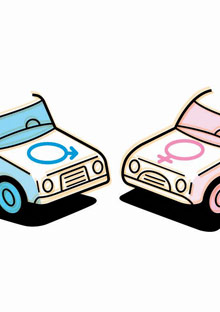What Driving Habits Really Mean

Illustration: Harry Campbell
We asked the experts to explain a few things about our behavior behind the wheel.
The balding suit in the Porsche? (Midlife crisis.) The woman with the armor-plated Hummer? (Anger issues.) The twosome in the Toyota Prius? (The perfect couple?) Sure, for some people, cars are simply a way to get around. But for others, there's a more complicated relationship at play, fraught with power and desire, memories and nostalgia, paralyzing anxiety or deep pleasure. More and more, scientists are fixing their high beams on the psychology of driving. Why We Buy the Cars We Do
What we drive often has to do with that other drive (yep, sex), says evolutionary psychologist Geoffrey Miller, PhD, author of Spent: Sex, Evolution, and Consumer Behavior. Miller compares the typical male BMW owner to the bowerbird of Australia, which builds elaborately decorated nests to lure females into what you might call his plush backseat. As for the woman driver, her zippy Mustang convertible advertises openness and assertiveness. Consciously or not, Miller says, humans use vehicles to signal their desirability as mates. "Cars are one of the most public displays we make to create a first impression."
In fact, a 2007 study by Miller in the Journal of Personality and Social Psychology found that men interested in a quick hookup are more willing to blow money on a flashy car: Miller will bet that women know on some level that a man in a Porsche Boxster is probably not husband material. As for when couples marry, their new concern for nurturing is often expressed in a planet-hugging hybrid or cocooning minivan.
Next: Curbing road rage, the perils of hands-free conversations, and more



